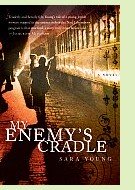|
My Enemy's Cradleby Sara YoungReviewed by Annis For a half-Jewish girl, Holland in 1941 is a precarious refuge. German occupying forces are implementing anti-Semitic laws. Her comfortable life with her Dutch relatives has been destroyed by paranoia and suspicion. Cyrla shares with her cousin Anneke, pregnant with the child of a German soldier, both a close relationship and an uncanny physical resemblance. The chance to escape comes at a terrible cost as Cyrla takes the place of her cousin at a German Lebensborn maternity home, becoming pregnant herself to do so. Tension mounts as her pregnancy advances and a planned rescue fails to materialise. Babies who are unacceptable by reason of physical defect or inferior bloodlines “disappear,” and Cyrla’s fear for her unborn baby grows suffocating. The Lebensborn project was part of a systematic racial and eugenic selection program overseen by Himmler. My Enemy’s Cradle uses its history to explore themes of sacrifice, guilt and the destructive toll of compromise with a morally perverted regime. Full of compelling imagery and compassion, this beautifully written novel celebrates the power of love to flourish in the most unlikely places, if only there can be trust and forgiveness enough to accept it. In Rainer Maria Rilke's words: Again and again, however we know the landscape of love (2007, 400 pages) More about My Enemy's Cradle at Powell's Books
Arms of Deliverance by Tricia Goyer (2006) More info Lebensborn by Will Berthold (German edition 1958; English translation 1977) More info
Master Race: The Lebensborn Experiment in Nazi Germany by Catrine Clay and Michael Leapman More info Children of World War II: The Hidden Enemy Legacy by Kjersti Ericsson () More info
Back to Historical Novels: World War II
|
 “If you leave them, people can die.” For Cyrla in My Enemy’s Cradle, this mantra is born of bitter experience. A bright, sensitive teenager who has lost her family, she consoles herself with the poems of Rilke, the inspiration for her own poetry.
“If you leave them, people can die.” For Cyrla in My Enemy’s Cradle, this mantra is born of bitter experience. A bright, sensitive teenager who has lost her family, she consoles herself with the poems of Rilke, the inspiration for her own poetry.